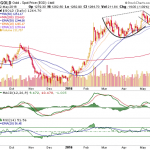Evident from the below chart of the S&P 500 Index and the Dow Jones Industrial Average, the start to 2016 has been a difficult one for investors. January saw a sharp decline in the equity markets; however, the month of February is working to repair the January damage.

We noted in a post at the end of the third weak of January, Sentiment Supportive Of Further Equity Gains, that sentiment data seemed overly bearish and the market could recover. Certainly this has been the case, yet institutional and investor sentiment continues to tilt more bearish than bullish.
The chart below displays the NAAIM Exposure Index. The NAAIM Exposure Index consist of a weekly survey of NAAIM member firms who are active money managers and provide a number which represents their overall equity exposure at the market close on a specific day of the week, currently Wednesday. Responses are tallied and averaged to provide the average long (or short) position or all NAAIM managers, as a group. This week’s data for the NAAIM Index continues to indicate active managers remain cautious on the equity market and is near levels notable for oversold markets.

Additionally, although individual investors are slightly more bullish based on the Sentiment Survey from the American Association of Individual Investors, bullish sentiment remains at a low level. Last week’s AAII report saw investor bullish sentiment increase to 31.19%, the first reading over thirty since the end of November last year. In order to smooth out the week to week volatility in the sentiment reading, we look at the 8-period moving average. As the white line in the below sentiment chart shows, this average continues to track at an extreme level, even lower than that reached at the bottom of the financial crisis in March of 2009.

One data point needing to see improvement is that associated with the consumer and a reasonably strong spending and income report was delivered for January. It appears the benefit consumers receive through low energy prices are beginning to translate into increased spending.













Leave A Comment